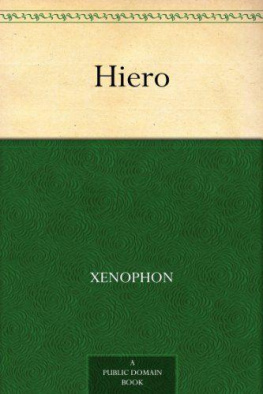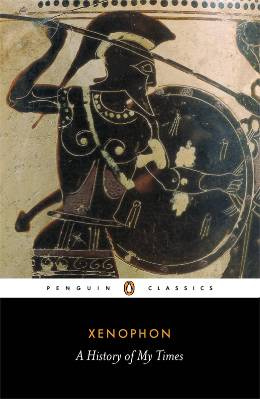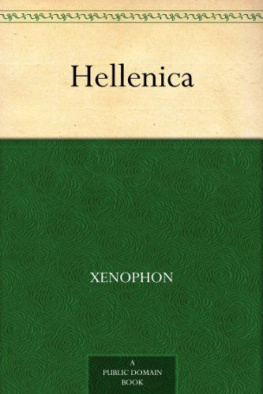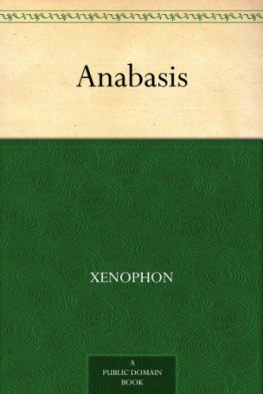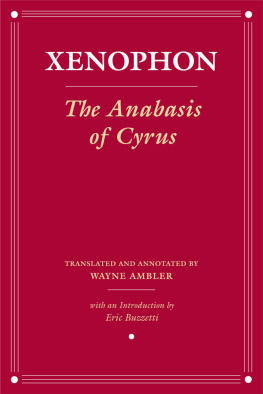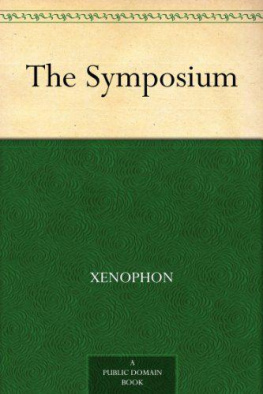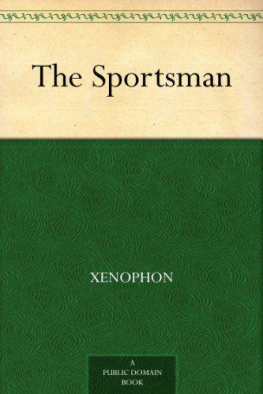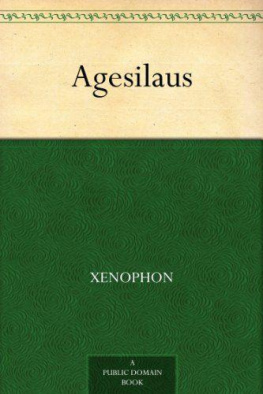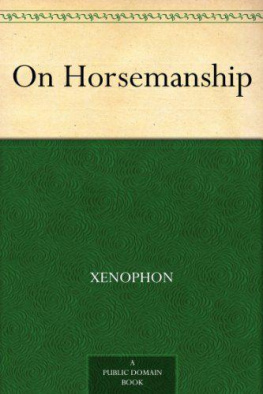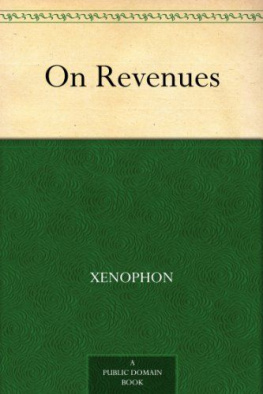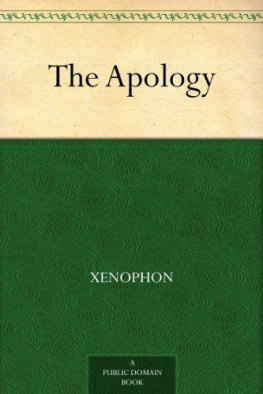Xenophon - Hiero
Here you can read online Xenophon - Hiero full text of the book (entire story) in english for free. Download pdf and epub, get meaning, cover and reviews about this ebook. year: 2012, genre: Science. Description of the work, (preface) as well as reviews are available. Best literature library LitArk.com created for fans of good reading and offers a wide selection of genres:
Romance novel
Science fiction
Adventure
Detective
Science
History
Home and family
Prose
Art
Politics
Computer
Non-fiction
Religion
Business
Children
Humor
Choose a favorite category and find really read worthwhile books. Enjoy immersion in the world of imagination, feel the emotions of the characters or learn something new for yourself, make an fascinating discovery.
Hiero: summary, description and annotation
We offer to read an annotation, description, summary or preface (depends on what the author of the book "Hiero" wrote himself). If you haven't found the necessary information about the book — write in the comments, we will try to find it.
Hiero — read online for free the complete book (whole text) full work
Below is the text of the book, divided by pages. System saving the place of the last page read, allows you to conveniently read the book "Hiero" online for free, without having to search again every time where you left off. Put a bookmark, and you can go to the page where you finished reading at any time.
Font size:
Interval:
Bookmark:
Xenophon the Athenian was born 431 B.C. He was a
pupil of Socrates. He marched with the Spartans,
and was exiled from Athens. Sparta gave him land
and property in Scillus, where he lived for many
years before having to move once more, to settle
in Corinth. He died in 354 B.C.
This was typed from Dakyns' series, "The Works of Xenophon," a four-volume set. The complete list of Xenophon's works (though there is doubt about some of these) is:
Work Number of books
The Anabasis 7
The Hellenica 7
The Cyropaedia 8
The Memorabilia 4
The Symposium 1
The Economist 1
On Horsemanship 1
The Sportsman 1
The Cavalry General 1
The Apology 1
On Revenues 1
The Hiero 1
The Agesilaus 1
The Polity of the Athenians and the Lacedaemonians 2
Text in brackets "{}" is my transliteration of Greek text into English using an Oxford English Dictionary alphabet table. The diacritical marks have been lost.
The Hiero is an imaginary dialogue, c. 474 B.C., between Simonides of Ceos, the poet; and Hieron, of Syracuse and Gela, the despot.
Once upon a time Simonides the poet paid a visit to Hiero the "tyrant," (1) and when both obtained the leisure requisite, Simonides began this conversation:
(1) Or, "came to the court of the despotic monarch Hiero." For the
"dramatis personae" see Dr. Holden's Introduction to the "Hieron"
of Xenophon.
Would you be pleased to give me information, Hiero, upon certain matters, as to which it is likely you have greater knowledge than myself? (2)
(2) Or, "would you oblige me by explaining certain matters, as to
which your knowledge naturally transcends my own?"
And pray, what sort of things may those be (answered Hiero), of which I can have greater knowledge than yourself, who are so wise a man?
I know (replied the poet) that you were once a private person, (3) and are now a monarch. It is but likely, therefore, that having tested both conditions, (4) you should know better than myself, wherein the life of the despotic ruler differs from the life of any ordinary person, looking to the sum of joys and sorrows to which flesh is heir.
(3) Or, "a common citizen," "an ordinary mortal," "a private
individual."
(4) Or, "having experienced both lots in life, both forms of
existence."
Would it not be simpler (Hiero replied) if you, on your side, (5) who are still to-day a private person, would refresh my memory by recalling the various circumstances of an ordinary mortal's life? With these before me, (6) I should be better able to describe the points of difference which exist between the one life and the other.
(5) Simonides is still in the chrysalis or grub condition of private
citizenship; he has not broken the shell as yet of ordinary
manhood.
(6) Lit. "in that case, I think I should best be able to point out the
'differentia' of either."
Thus it was that Simonides spoke first: Well then, as to private persons, for my part I observe, (7) or seem to have observed, that we are liable to various pains and pleasures, in the shape of sights, sounds, odours, meats, and drinks, which are conveyed through certain avenues of senseto wit, the eyes, ears, nostrils, mouth. And there are other pleasures, those named of Aphrodite, of which the channels are well known. While as to degree of heat and cold, things hard and soft, things light and heavy, the sense appealed to here, I venture to believe, is that of the whole body; (8) whereby we discern these opposites, and derive from them now pain, now pleasure. But with regard to things named good and evil, (9) it appears to me that sometimes the mind (or soul) itself is the sole instrument by which we register our pains and pleasures; whilst at other times such pains and pleasures are derived conjointly through both soul and body. (10) There are some pleasures, further, if I may trust my own sensations, which are conveyed in sleep, though how and by what means and when precisely, are matters as to which I am still more conscious of my ignorance. Nor is it to be wondered at perhaps, if the perceptions of waking life in some way strike more clearly on our senses than do those of sleep. (11)
(7) Or, "if I may trust my powers of observation I would say that
common men are capable of pains and pleasures conveyed through
certain avenues of sense, as sight through our eyes, sounds
through our ears, smells through our noses, and meats and drinks
through our mouths."
(8) Cf. Cic. "de N. D." ii. 56, S. 141.
(9) Reading {edesthai te kai lupeisthai...} or if with Breit
reading {ote d' au lupeisthai}, transl. "then as to good and evil
we are affected pleasurably or painfully, as the case may be:
sometimes, if I am right in my conclusion, through the mind itself
alone; at other times..."
(10) Or, "they are mental partly, partly physical."
(11) Lit. "the incidents of waking life present sensations of a more
vivid character."
To this statement Hiero made answer: And I, for my part, O Simonides, would find it hard to state, outside the list of things which you have named yourself, in what respect the despot can have other channels of perception. (12) So that up to this point I do not see that the despotic life differs in any way at all from that of common people.
(12) i.e. "being like constituted, the autocratic person has no other
sources of perception: he has no claim to a wider gamut of
sensation, and consequently thus far there is not a pin to choose
between the life of the despot and that of a private person."
Then Simonides: Only in this respect it surely differs, in that the pleasures which the "tyrant" enjoys through all these several avenues of sense are many times more numerous, and the pains he suffers are far fewer.
To which Hiero: Nay, that is not so, Simonides, take my word for it; the fact is rather that the pleasures of the despot are far fewer than those of people in a humbler condition, and his pains not only far more numerous, but more intense.
That sounds incredible (exclaimed Simonides); if it were really so, how do you explain the passionate desire commonly displayed to wield the tyrant's sceptre, and that too on the part of persons reputed to be the ablest of men? Why should all men envy the despotic monarch?
For the all-sufficient reason (he replied) that they form conclusions on the matter without experience of the two conditions. And I will try to prove to you the truth of what I say, beginning with the faculty of vision, which, unless my memory betrays me, was your starting-point.
Well then, when I come to reason (13) on the matter, first of all I find that, as regards the class of objects of which these orbs of vision are the channel, (14) the despot has the disadvantage. Every region of the world, each country on this fair earth, presents objects worthy of contemplation, in quest of which the ordinary citizen will visit, as the humour takes him, now some city (for the sake of spectacles), (15) or again, the great national assemblies, (16) where sights most fitted to entrance the gaze of multitudes would seem to be collected. (17) But the despot has neither part nor lot in these high festivals, (18) seeing it is not safe for him to go where he will find himself at the mercy of the assembled crowds; (19) nor are his home affairs in such security that he can leave them to the guardianship of others, whilst he visits foreign parts. A twofold apprehension haunts him: (20) he will be robbed of his throne, and at the same time be powerless to take vengeance on his wrongdoer. (21)
Font size:
Interval:
Bookmark:
Similar books «Hiero»
Look at similar books to Hiero. We have selected literature similar in name and meaning in the hope of providing readers with more options to find new, interesting, not yet read works.
Discussion, reviews of the book Hiero and just readers' own opinions. Leave your comments, write what you think about the work, its meaning or the main characters. Specify what exactly you liked and what you didn't like, and why you think so.

